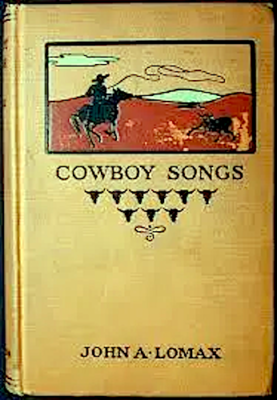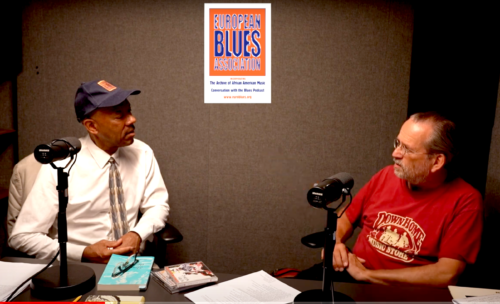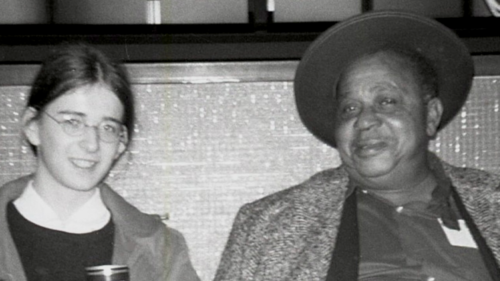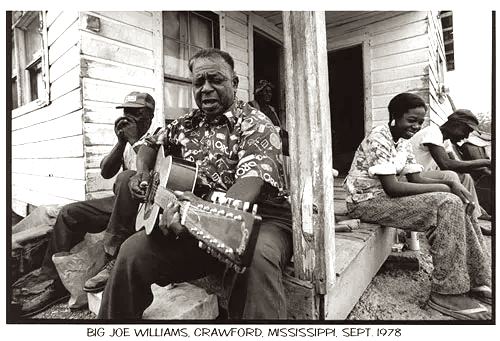In this column: blues enthusiasts, folklorists, musicologists, motivation, passion, Nat Blythe, adventures of a ballad hunter, George Lyman Kittredge, Cowboy Songs, John Avery Lomax, Henry Lebermann, Uncle Rich Brown, Muddy Waters, Son Simms, interview Muddy at Stovall's Plantation, Son Simms Four, Bruce Jackson, wake Up Dead Man, Tim Duffy, Eric Clapton, Axel Küstner, Michael Roach, SundayBlues.org, Big Joe Williams, Bob Dylon, Alan Lomax, help and funding, Jewish people playing a key role, Jewish and African American Diaspora, Diaspora visualized
Introduction
Lured by the adventure, many young men went out in search of songs that had their roots in the past. John Lomax, who grew up on a farm, was inspired at a young age by Nat Blythe, a former slave hired as a farmhand by his father. In his memoir “Adventures of a Ballad Hunter,” Lomax tells how he arrived at the University of Texas with a list of cowboy songs he had written down in his youth. Which started his musical adventure.
George Lyman Kittredge
George Lyman Kittredge (professor of English literature at Harvard University, who was also involved in American folklore studies) said to John Lomax:
"Go and get this material while it can be found.” "Preserve the words and music. That's your job."
Kittredge pioneered modern methods of ballad study, and encouraged collectors to get out of their armchairs and library halls and to get out into the countryside to collect ballads first hand. When he met John Lomax in 1907, this was what he encouraged him to do; the cowboy songs Lomax had been writing down were glimpses into a whole new world, and Lomax should follow up on his work.

John Avery Lomax
One man Lomax recorded, whose name was only given as Blue, at the Smither Farm in Walker County concluded his singing by addressing President Franklin Delano Roosevelt and urging him to come to Texas and do something for the poor folks on tenant farms. Alan Lomax later wrote that his experience at the farm changed his life and the mission for his work. From that point forward, he believed he needed to record the views of the unheard people in rural America.

Muddy Waters hearing himself again after a recording:
“I really heard myself for the first time. I’d never heard my voice. I used to sing; used to sing just how I felt, ’cause that’s the way we always sang in Mississippi,” Waters told one journalist. “But when Mr Lomax played me the record I thought, man, this boy can sing the blues.”

Caption of the videos below
1) The interview is from the legendary 'Down On Stovall's Plantation' field recordings in Mississippi done in 1941 and 1942. In this first part, you hear Muddy introduce himself and then John Work asks the first few questions, followed by Alan Lomax. They discuss the song Burr Clover Farm Blues; one of Muddy's first recordings.
2) Alan Lomax asks Muddy about his life, his guitar-playing style and his song writing process.
Muddy Waters Talks To Alan Lomax (part 1; photo Muddy showing his first record)
Muddy Waters Talks To Alan Lomax (part 2)
Son Simms Four – Ramblin Kid Blues (1942, field recording Alan Lomax; Henty “Son” Simms, violin, Muddy Waters, vocal and guitar, Percy Thomas, vocal and guitar, Louis Ford, mandolin)
Bruce Jackson
“I was interested in the black convict work songs,” Jackson recalled, “because they go back to a slavery-time musical tradition which in turn goes back to an African musical tradition.
It’s a pure, unbroken line of musical performance and style, and the way music and physical labor integrated with one another.”
“I could relate to these guys and their world. I liked the music and thought it was important. What was going on in their lives was important. And it was important to tell their story. I didn’t know how I was going to tell the story, but I knew it was important to accumulate the elements, like collecting pebbles.”
Tim Duffy
“Music is important to who we are as a country,” Duffy says. “The U.S. does not have a common religion or ethnicity, but we have this music. It’s our most powerful language and it was mostly created here in the South. North Carolina does not tell its music story enough.”

Axel Küstner
"It started for me when I was 13 years old with three albums, containing music I had not heard before and played by men with appealing names such as Howlin' Wolf and Muddy Waters. It was 1969 when I bought the promo albums "Blues News" and "The Blues". “The Blues” was a two-album set from Columbia; one LP with a mix of British artists and Americans living in Europe, the other LP contained old Columbia recordings with, among others, Son House, Ma Rainey, Robert Johnson, Blind Lemon Jefferson. I looked at the liner notes and saw Blind Lemon Jefferson "Prison Cell Blues" 1928. I had no idea that people were making records at that time. After that, Columbia (CBS) released an album with Son House (The Legendary Son House father of folk blues) with his resonator guitar. My interest has developed from those three albums. Buying LPs, reading liner notes, looking at pictures on the covers, until I made my first trip to the United States in 1972."

Bob Dylon quote
"There is a distinguished gentlemen here who came...I want to introduce him – named Alan Lomax. I don't know if many of you have heard of him. Yes, he's here, he's made a trip out to see me. I used to know him years ago. I learned a lot there and Alan...Alan was one of those who unlocked the secrets of this kind of music. So if we've got anybody to thank, it's Alan. Thanks, Alan."
Dylan and Big Joe Williams – Sittin On Top Of The World
Research help and funding
To conduct good research, an information network, a position at university, financial compensation in the form of a subsidy or cultural fund, but also certainly support from home (see The Lomaxes), help.
Universities of Louisiana, Connecticut, Mississippi, Texas at Austin (Texas Folklore Society), and others,
Funds from The Smithsonian Institution ( the world's largest museum, education, and research complex, "We are a community of learning and an opener of doors."), American Folklife Center at the Library of Congress, Guggenheim Fellowship (are grants that have been awarded annually since 1925), and others.
For example in 1934, John A. Lomax was named Honorary Consultant and Curator of the Archive of American Folk Song, a title he held until his death in 1948. His work, for which he was paid a salary of one dollar, included fund raising for the Library, and he was expected to support himself entirely through writing books and giving lectures. Lomax secured grants from the Carnegie Corporation and the Rockefeller Foundation, among others, for continued field recordings.
Note
One-dollar salaries are used in situations where an executive wishes to work without direct compensation, but for legal reasons must receive a payment above zero, so as to distinguish them from a volunteer.
People with a Jewish background
What is also noticeable is the number of people with a Jewish background, who played a key role in developing and popularizing African American music, including rhythm and blues, and the independent record business was dominated by young Jewish men, and some women, who promoted the sounds of black music.
Therefore, the Blues became an institutional platform of African American culture to tell their stories, self-define their identities and express their attitudes through music.
They must have felt a great affinity with the African American culture. It may be explained by the fact that both African Americans and Jews have been subject to a diaspora.
The Jewish diaspora or exile is the dispersion of Israelites or Jews out of their ancient ancestral homeland (the Land of Israel) and their subsequent settlement in other parts of the globe.
The global African diaspora is the worldwide collection of communities descended from people from Africa, predominantly in the Americas.
The term most commonly refers to the descendants of the native West and Central Africans who were enslaved and shipped to the Americas via the Atlantic slave trade between the 16th and 19th centuries, with their largest populations in Brazil, the United States, and Haiti (in that order).





